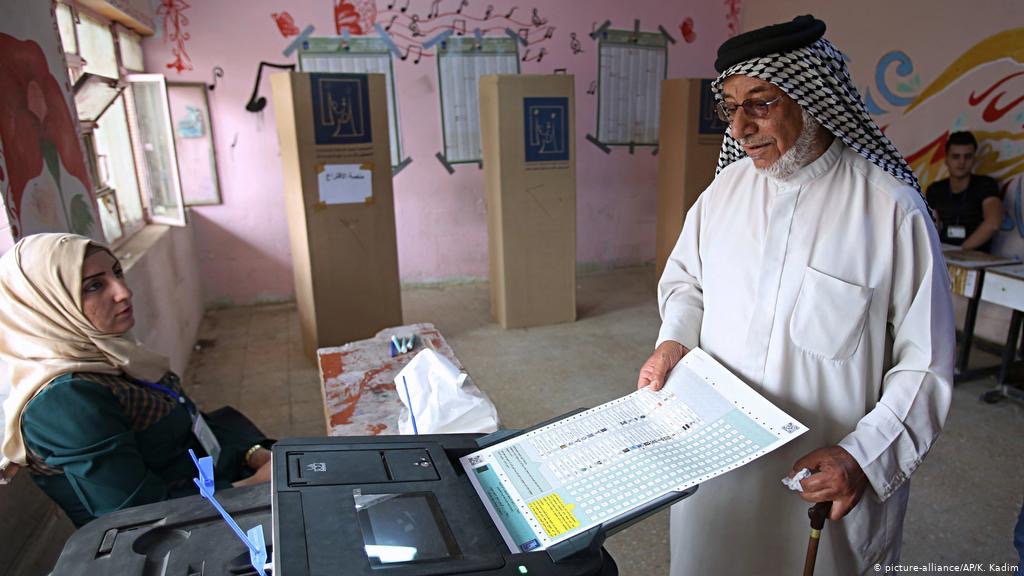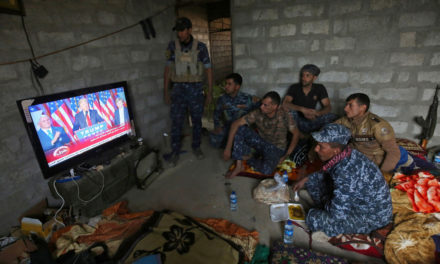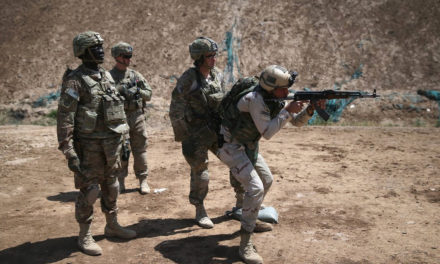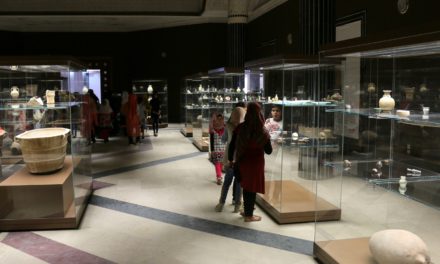(Photo: Karim Kadim/AP)
Since October 2019 hundreds of thousands of Iraqis have taken to the streets, enraged at the kleptocratic system that has Iraq ranked 162 out of 180 in Transparency International’s 2019 Corruption Index. It was a full-throated rejection of a 17-year experiment with al-demokratiya al-tawafikiya or the model of consensus democracy that produced a particular system of bad governance.
This model rests on three fundamentals: methodical division of spoils, collective distribution of failures, and inclusivity. Locals compare it to another Mesopotamian model: Noah’s Ark, for this latter is known biblically to have had a pair of each being on board. What is unique in Iraq is that while the model offers all major actors a leg in the government’s ark, it also affords them an escape route, to have the other leg outside. It is commonplace to see elites leading the government while simultaneously protesting it.
On the surface, consensus seems a noble idea embodying cooperation and accommodation. However, once one digs deeper, they are bound to see the ruling elites to have taken this idea to a distorted extreme. Emptied of its original meaning and replaced with a time-consuming process that produces an inefficient ruling class and precludes both genuine opposition and accountability.
Troubles with consensus arise as soon as election results are announced, kick-starting a process, time-consuming by nature as it requires the involvement of all parties in a process, of “soul-searching” to identify an individual who can meet the expectations of the various elites. Once that individual is found, he is expected to negotiate and form a government inclusive of the very broad range of factions that brought them into power. This challenging task: having to engage in endless negotiations over a candidate agreeable to all has on many occasions left the country without a government, let alone a consensus one, for months on end as elites failed to agree on a candidate. The appointment of Prime Minister Mustafa Al-Kadhimi, on 7 May 2020, is a case in point. Even though Iraq was drowning in health, security, political, economic and other crises, it took Iraq’s political class, one of the most notoriously divided around the world, six months to settle on Kadhimi.
A consensus premier is often a “compromise” one, and it is precisely the fact of being a “compromise” that tends to produce particularly weak and paralyzed leaders.
During the negotiation phase, these nominally consensual democrats have little collective progress, as the period of cooperation often lasts as, or little over, as long as it takes to staff the government – certainly not decide on its policies. There are the various strands of conservatives, liberals, nationalists, and more, whose competing policy preferences, ideologies and loyalties any prime minister would find difficult to reconcile, and thus be forced to accommodate. The running joke when Adil Abd Al-Mahdi became a caretaker premier is that Iraqis did not feel the difference; they have always seen him in a caretaker role, literally taking care of the competing interests of those that put him in office. Failure to do so would cause colossal headache, literally and figuratively, to any premier.
With “consensus”, state institutions become the spoils, and the process of consensus building is merely the dividing up of the cake. A result of this has been the relegation of opposition forces to inconsequence, gravely impeding the proper development of that democratic institution. Democracy can only function more meaningfully when there is a critical political opposition force, securitizing decisions and offering alternative policy directions.
The cake includes not only access to government resources, contracts, jobs to loyalists, etc., but also offers legal protection and shirks thorny issues like reform and combating corruption. No reformist official is willing to pursue reforms at the expense of members of the consensus because that would be seen as threatening to the consensus and the presumed stability emanating from it. In the end, the web of corruption become so tangled that the country’s elites have ultimately reached a tacit agreement by which they flout corruption against each other. This is perhaps one reason why ordinary Iraqis have yet to see a major political actor get investigated, let alone indicted.
Even more, consensus affords elites the opportunity to deal with public criticism by hiding behind the veneer of consensus and insisting that decisions are not up to them alone. In the end, voters have little clarity on who is leading and based on what vision, and it is no wonder Iraqis have become disillusioned with the entirety of consensus democracy, and it is one reason why they proclaim, kulhum ya’ni kulhum (all means all) when they protest against the political class.
Iraq’s democracy is at a critical juncture, threatened by manipulations and abuses in the name of consensus and inclusivity. Iraq should move away from the practice that has proven to be a failure. The World Bank has consistently ranked Iraq low on political stability, rule of law, and government effectiveness, but high when it comes to corruption, violence, and terrorism.
It is past due that a majority government is given a chance, formed by like-minded parties and members of parliament of the various ethno-sectarian backgrounds, enough of them to get the prime minister to a fifty-percent-plus-one majority, with or without wide-ranging consensus. Such a setup would serve many purposes. First, it would allow for the formation of a government of parties with a collective vision, which, if for no other reason than electoral purposes, is expected to deliver. Second, it would allow for a clear opposition force, scrutinizing the government’s work and helping hold it accountable. Third, it would allow citizens and voters to identify and blame those in the ruling coalition in the event of failure.
But the authors and actors of this status quo system will emphatically put up a fight because they have no interest in changing it. First, they inherently distrust each other and state institutions, and benefit too much from the current set-up. As they ostensibly work together, however, that mutual distrust and the self-interest does not go away – they are simply put on mute. Second, there is no appreciation for the value of an oppositionist movement, as value is only attributed to cashing in on the state’s spoils. Third, reforms almost inherently come at the expense of weakening the scheme of rent-based activities. Finally, and most critically, consensus muddies the waters of accountability – leaving parties to act with relative impunity.

Yasir Kuoti
Yasir Kuoti is a Baghdad-based researcher and political analyst.










